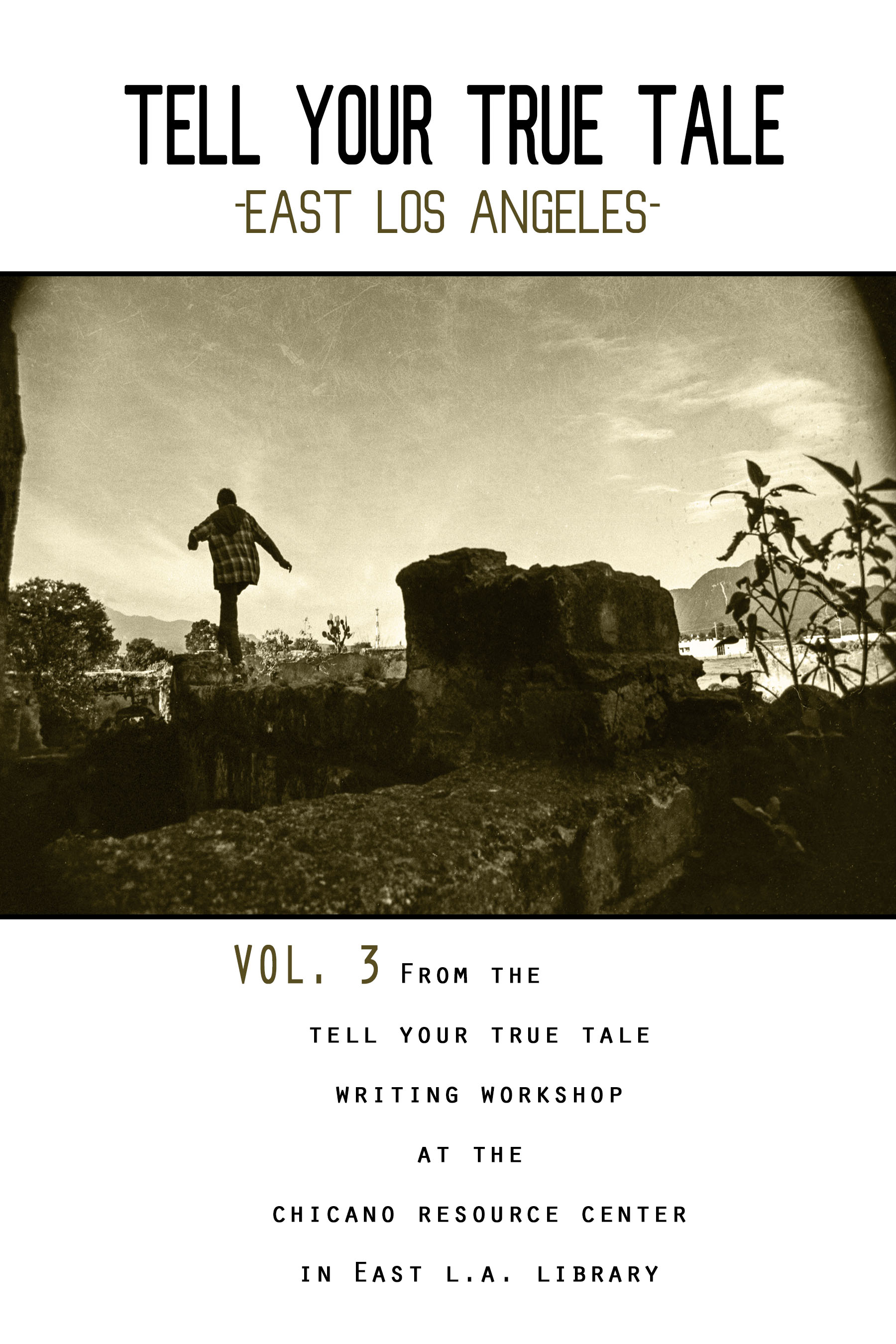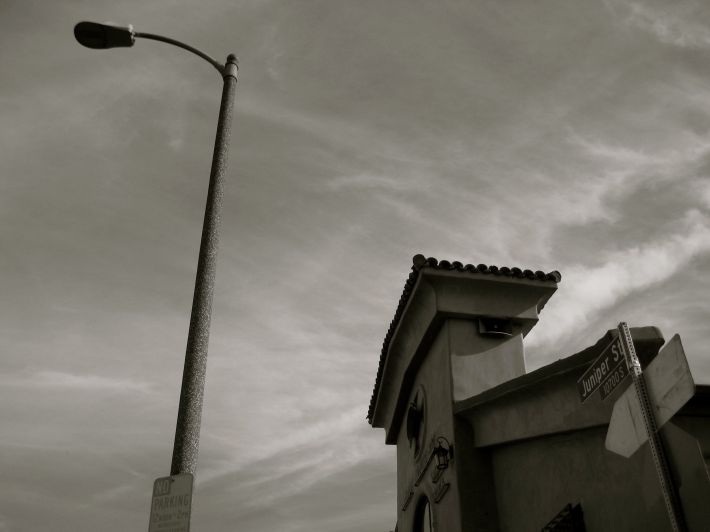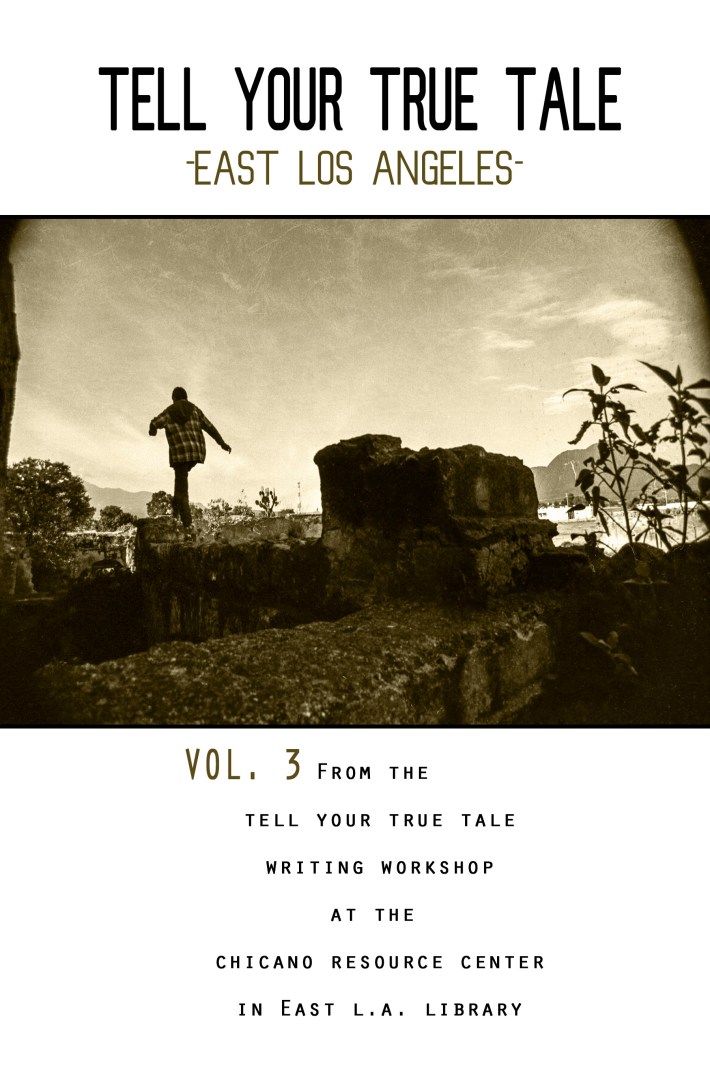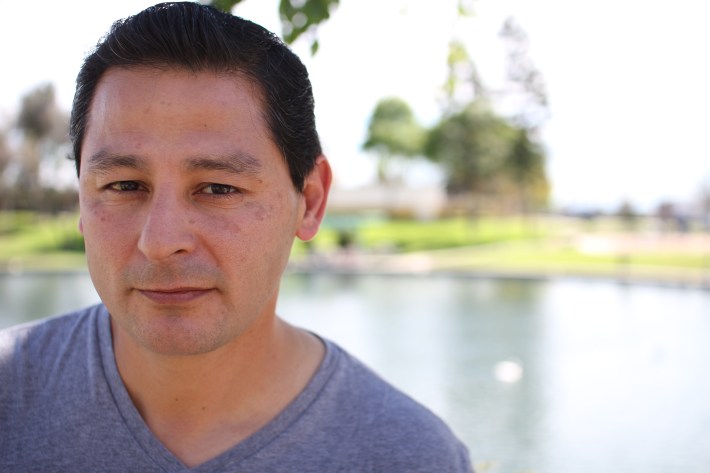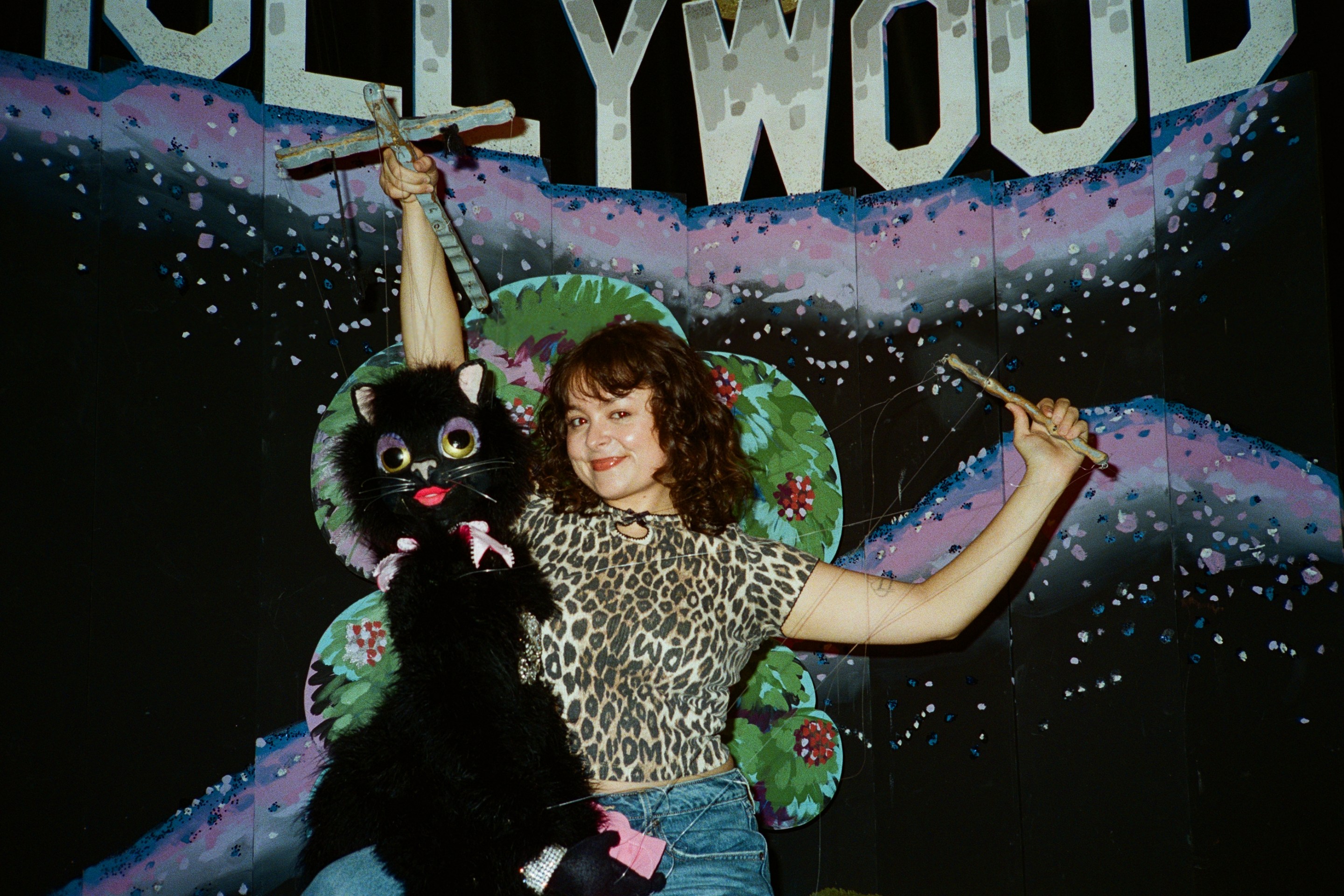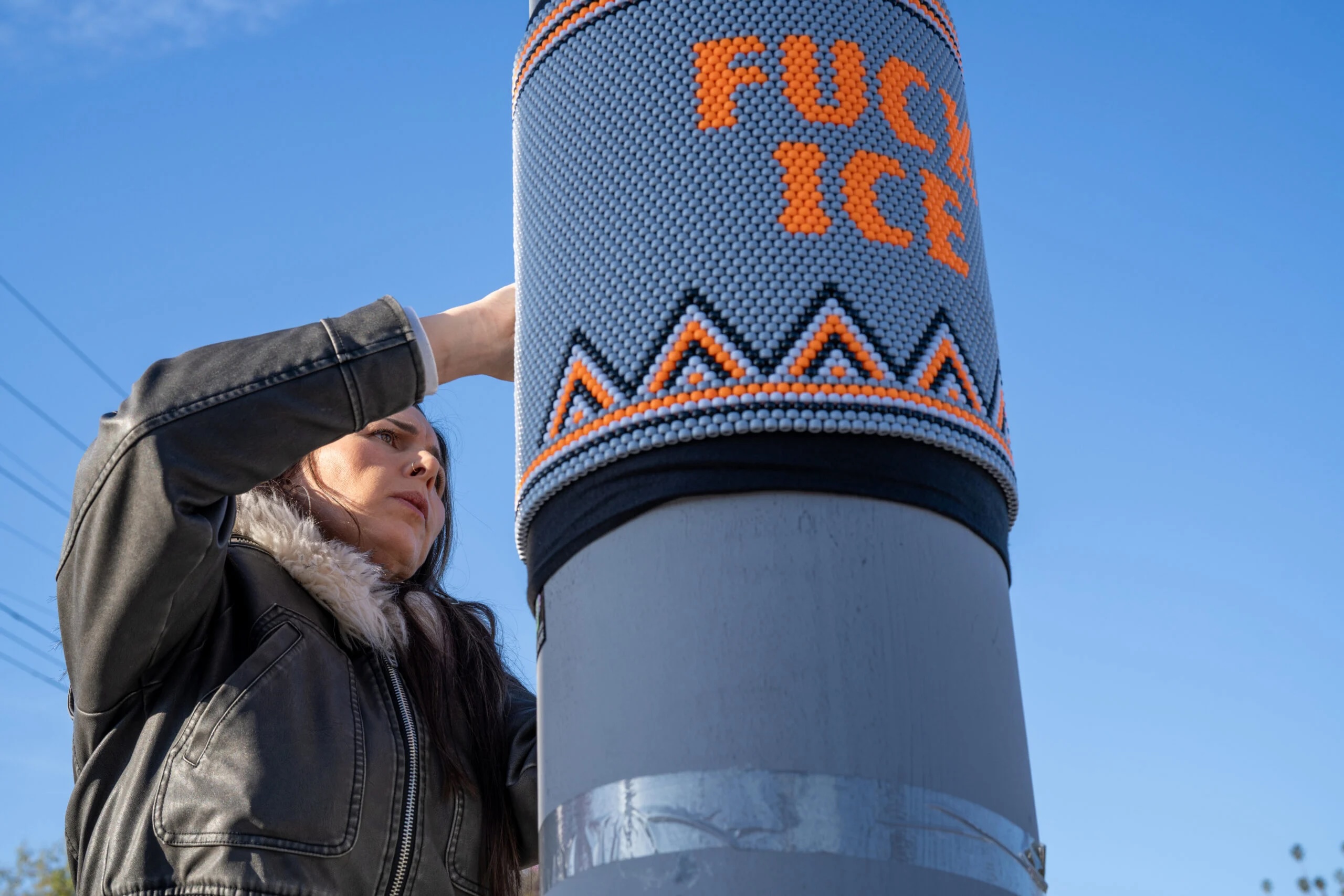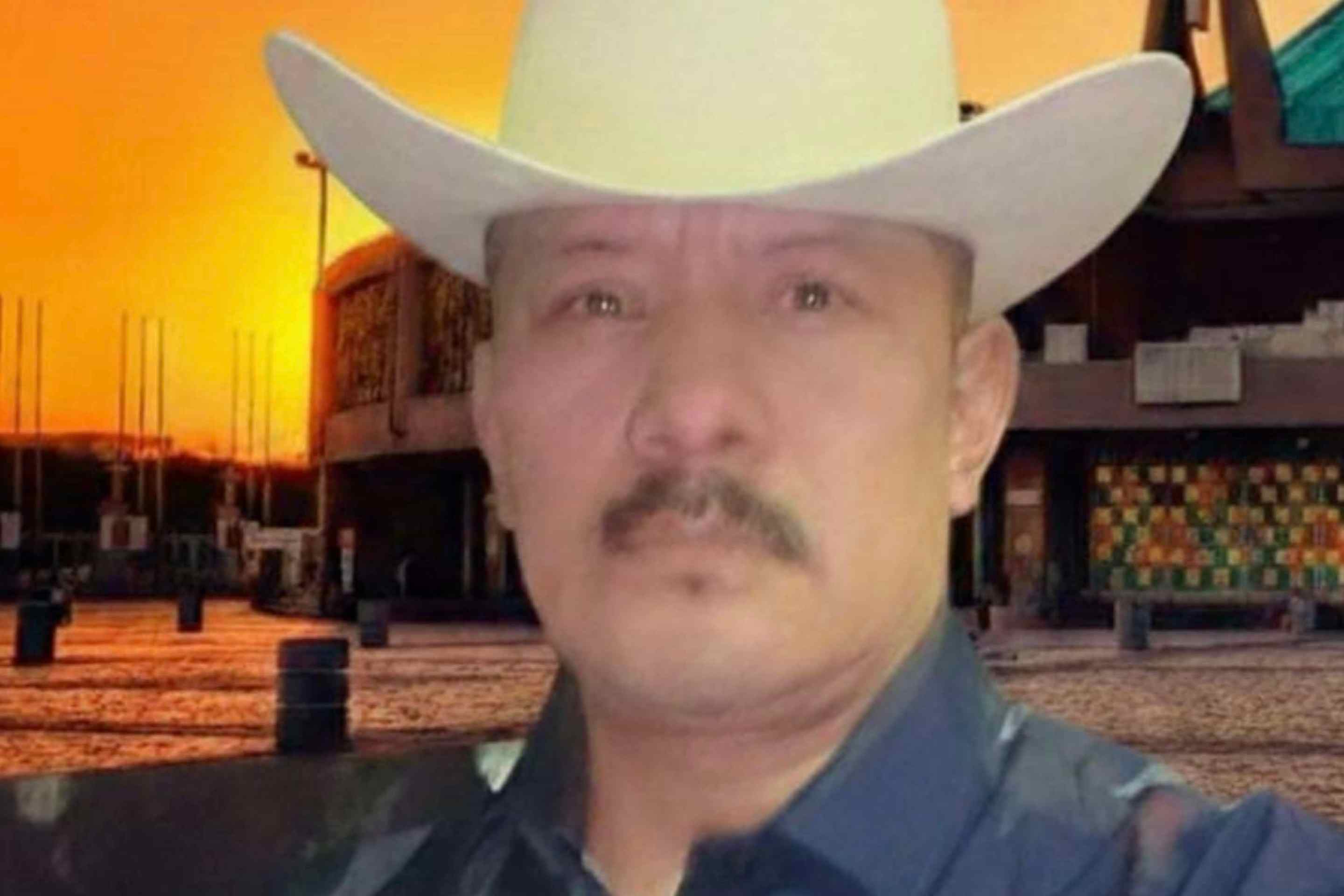The following story comes from the forthcoming Tell Your True Tale Volume 3. These compilations, created by Sam Quinones, have become an increasingly rich mix of stories out of the ELA area. Volume 1 and Volume 2 are also available on Amazon. The county library has created a dedicated site for the project, and the authors along with Sam will periodically do live readings and workshops. Additional information available at the end of the story.
---
As we walked toward the corner of Juniper and 108th, the bright glow of the streetlight made it even harder for us to keep from swaying. There were three of us, Jose Varela, Jose Villalobos, and myself, Jose Nunez, trying to decide which way to go.
Varela, the oldest, swayed and yelled, “Ya fools are drunk as hell!”
Villalobos giggled and stomped toward Varela and scolded him.
“What you expect? We just drank a 40 of Old E.”
Varela pushed him away.
“Shut your ass up before I knock you out.”
Villalobos put his hands up and threw a couple of punches.
“What’s up? You want some? Come get some, homes. What, you scared? Chabala. Ranker. Leva. That’s what I thought, punk.”
We all laughed.
I stood there quietly with my hands in my pocket searching for change that I knew I didn’t have.
“I thought we were going to a party?”
It was past midnight and our only option was up the street toward the music coming from a parked car. Varela led the way. He was a year older than Villalobos and me, and, at 15, he was a head taller with a full mustache. This was his neighborhood, and his nickname, Crow, was on more than a couple of walls. His grandfather trained kids to box in his own front yard. There was a full-size boxing ring with a speed bag nailed to a tree. His oldest uncle, Modesto, was good enough to try out for the Junior Olympics, but got stabbed at a party that left his right leg partially paralyzed. Varela trained too, but I think he loved basketball more. We once fought in the middle of the street with gloves on and it was no match. I was smaller then and always trying to prove myself.
“Where we going?” I slurred as I stepped off the curb and stumbled to catch myself from falling.
Villalobos giggled again.
“Yo momma’s house.”
Funny thing was, Villalobos’s momma lived just three houses down from where we were standing, and if she knew her 14-year-old son was out drinking and walking these streets, she probably would have whooped all three of us. She was nice and all, but strict. I would spend the night at his house and go to church the next day.
We passed the corner house where a girl named Gerri used to live. I always wonder what became of her. One day after football practice, I remember, she asked me to go see her at her cousin’s house. I was surprised by the invite, and felt the butterflies kick in as soon as practice was over. Gerri was a year older and pretty as hell, with hair to her waist that danced when she walked, and a smile that matched her laugh. Her cousin lived half way up the street from her house, and out of view from her mother. She took no chances and walked out of the house and stood a few feet away from the gate making sure that a tree blocked the view of the front door to her house. Her mother must have been home.
“So who do you like?” was how she started.
“Huh?” Caught off guard, I panicked.
“Nobody.”
“How about Yolanda?”
“Who?”
She stomped her foot. “Yolanda Lopez!”
“She’s all right, I guess.”
We talked about Yolanda most of the time and that was okay as long I got to talk to Gerri. The next day I was Yolanda’s boyfriend. We lasted for three days. I guess she could tell I wasn’t into her and Gerri never asked me to meet me at her cousin’s again. I should have been nicer to Yolanda.
Gerri had two older brothers who were protective and fierce. Once, they got into it in the middle of the street - a full-on fistfight, just the two of them. People came out to see the show, but their mother wasn’t too happy. Her screams were useless. They kept fighting. So she went into the house and came out with a monkey wrench, the same monkey wrench that her son used to open the fire hydrant in the summer. She looked mad enough to swing at their heads. Instead, she smashed the windshield to her oldest son’s Impala. That stopped the fight. The look on her son’s face when he walked over to his car was painful. He didn’t say a word. He just got in his ride and left. With brothers like that, you had to be real careful not to try anything with Gerri.
We finally got to the car parked in the alley. Varela jumped in the back seat with some girls.
By this time Villalobos and I were standing in the shadows next to five or six gangsters from the neighborhood.
“What’s up, Villalobos! You guys been partying or what?” was the first voice that belonged to Fausto, Varela’s uncle.
“Yeah, man, we’ve been drinking Old English. We’re tore up for real,” he yelled loud enough for the whole neighborhood to hear, including the nuns in the convent up the block.
The nuns lived in a two-story convent next to the priest’s house. They taught at San Miguel Catholic School across the street from the convent, where the three of us met. The nine Sisters of the Love of God were from Spain and came to the United States, learned English, went to college and taught kids from Watts right from wrong. There were some nice ones, but others ruled with iron fists. Sister Mary was one of them. She was my second-grade teacher. During recess she caught me doing something and began to reprimand me. I was in the fourth grade by then and should have known better than to talk back to her. I interrupted her with, “Sister, it’s because…” and before I could finish my sentence, wham, came a slap across my face.
“Callese! Don’t talk back!” she said in a heavy accent before walking away.
I stood watching her waddle back to class. To this day I’m not sure what I did. There was no chance in hell of turning her in. Corporal punishment was the law of the land back then and the nuns had Jesus in their corner. I just accepted it. Plus, if word got back home, I’d probably get it worse.
I entered San Miguel in the middle of second grade. Celso, my father, found out about the school from a grocery owner in Compton where we lived, before my parents separated and we moved to Watts. He thought it was better to be taught by nuns than in a public school. Tuition was always a problem but my parents made ends meet. Pops was a gardener so he mowed the lawn at the priest’s house. Concha, my mother, volunteered every chance she got. She cooked the menudo on Saturday for Sunday breakfast. My siblings and I helped set-up the tables and chairs. We spent a lot of time in the parish hall setting up for breakfast and dances and even DJ’d when we got older.
Those dances would bring the neighborhood together, young and old. The older crowd would dance to a conjunto that played cumbias and rancheras, and then the DJ would play for us. The three Jose’s were there as well along with our Mothers.
At one dance, Varela spotted my mom walking across the dance floor.
“Man, Nunez, here comes your Mom!”
She asked me first.
“Andale, Jose, vamos a bailar?”
“Aw, Ama, no quiero bailar rancheras.”
She worked her way down the line.
“Andale, Villalobos. Vamos,” she said, as she pulled his arm. He either liked dancing rancheras or was too nice to say no to my Mom that night.
“Here you go, homes,” said one of the shadows and passed a joint to Fausto. He took a hit and passed it back. He turned to us.
“Don’t do drugs. It’s bad for you.”
The homeboys chuckled.
“Naw, it’s cool. We only do hardcore drugs,” was Villalobos’ response, but the joke didn’t get past the smoke.
I overreacted.
“You’re a fool, Villalobos!”
I went back to trying to be cool in the shadows. If it were the middle of the day we wouldn’t be caught dead hanging out with gangsters from La Colonia. This was the nickname for our neighborhood given by the old Mexican families that came here in the ‘30’s and ‘40s. La Colonia was four square blocks sliced up by one-ways and centered around the church. The small streets had even smaller houses. Most were wooden bungalows built back in the ‘20’s and ‘30’s that were too cold in the winter and too hot in the summer. On those hot summer days, the homeboys from La Colonia opened fire hydrants to cool off. These same homeboys claimed La Colonia as their own. They had rivals on all sides and the feuds often brought tragedy.
One mother found her little boy slumped over his cereal killed by a stray bullet. My classmate’s father was talking to a neighbor and didn’t duck the bullet meant for the homeboy who was running for his life. There was also Christina, a girl who Villalobos married a few years later. Her family had moved to our neighborhood from East L.A., where her brother had some trouble. Early one Saturday, the trouble followed him home, where he was ambushed and killed.
All three of those families lived on our street.
“One time!”
The homeboy closest to the curb put down his beer. Before I could turn, lights from a Sheriff cop car were on us.
“Put your hands up!”
No one moved more than they had to and Villalobos and I followed everyone’s lead. We turned and faced the fence. I turned to look for Varela. He had a gun pointed at him and his hands were sticking out of the window.
“Interlock your fingers and look straight ahead!”
The cop squeezed my hands and pulled my head back while he searched me. I was stunned by the amount of force. I guess if you’re going to hang out at midnight with gangsters you’re going to get searched like one. My buzz was gone. I started to get cold and wondered if Sister Mary was looking out the window of the convent to see what trouble makers were out this late. Lucky for us the cops swooped in on us without the siren. They quickly went down the line. After he finished, I turned to face the cop. Varela was still being searched on the other side of the car. He was cooperating.
“Get the hell out of here!” one of the cops said finally.
We started to walk up the street. Varela was close behind and the rest of the homeboys took off in different directions.
We laughed and pushed each other around as we headed toward Villalobos’ house. We tiptoed into his house, hoping his mom wasn’t awake. I was on the floor in a sleeping bag when his Mom opened the door. It was dark, she didn’t even turn on the light, but we knew she was mad. I pretended to be asleep. Villalobos was going to get it.
My worry was bigger. I pictured Sister Mary calling my Mom to tell her who she saw in the alley that night.
---
This story is part of Tell Your True Tale is a writing workshop, devised by journalist, former LA Times reporter and author, Sam Quinones, as a way of helping new writers cultivate their storytelling voice. Find out more about his workshops, read more TYTT stories and his True Tales: A Reporter’s Blog, and contact him --all through his website: www.samquinones.com.
Jose Nunez is a middle-school teacher living in Los Angeles. This is his first story for Tell Your True Tale. Contact him at jxn6121@gmail.com.
